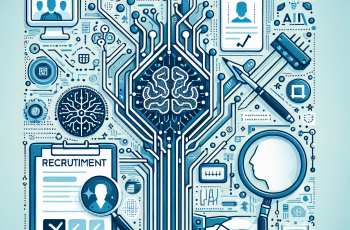AI and Data Privacy: Navigating the Challenges in Today’s Recruitment Landscape
Estimated reading time: 7 minutes
Key takeaways:
- AI technologies present significant data privacy challenges in recruitment.
- Transparency and ethical AI practices are essential to uphold candidate trust.
- Global regulations require HR professionals to be vigilant about compliance.
- Technological safeguards can mitigate risks associated with AI data usage.
- Continuous audits and diversity in datasets are critical to combat bias.
- Overview of AI and Data Privacy
- Key Data Privacy Concerns with AI
- Regulatory and Ethical Challenges
- Mitigation Strategies and Solutions
- Current and Emerging Issues
- Conclusion
- FAQ
Overview of AI and Data Privacy
Artificial intelligence fundamentally relies on vast quantities of data to function effectively. As AI technologies—particularly those powered by large language models and machine learning algorithms—expand into various sectors, the scope and complexity of data privacy challenges grow significantly (Stanford HAI). The recruitment industry is at the forefront of this evolution, where recruitment tools powered by AI analyze candidate information to streamline hiring processes and improve accuracy. However, this reliance also raises questions about how data is collected, stored, and used.
Key Data Privacy Concerns with AI
Global Data Flows and Jurisdictional Challenges
AI systems often operate across international borders, complicating regulatory compliance and the enforcement of privacy protections. The global reach of AI makes it difficult to establish uniform data handling standards and governance (OVIC). For HR professionals, understanding these international frameworks is crucial, as different regions may have varying laws regarding data protection and privacy, impacting recruitment strategies.
Opaque Data Collection and Use
Many AI-powered platforms collect and process personal information without clear user consent or understanding. This lack of transparency leads to significant privacy risks, including unauthorized data use and covert data harvesting. Users may be unaware of how their data is sourced or shared, which can result in targeted advertising, profiling, discrimination, or even identity theft (DataGuard). As a recruitment professional, this highlights the importance of choosing AI solutions that prioritize transparency and user consent.
Biometric and Sensitive Data Risks
AI applications increasingly rely on biometric data (facial recognition, voiceprints, etc.), amplifying the potential impact of data misuse. Unauthorized access or usage of such data types can have severe personal and societal consequences (DataGuard). HR departments looking to leverage such technologies must prioritize ethical guidelines and robust security measures to protect candidates’ sensitive information.
Algorithmic Bias and Discrimination
AI systems can inadvertently reinforce or exacerbate societal biases, especially when trained on biased or non-representative datasets. This raises concerns about fairness, discrimination, and the protection of sensitive information (DataGuard). Recruitment teams need to implement continuous audits and employ diverse datasets to train AI models, ensuring that their outcomes promote equity and inclusivity.
Security and Cyberthreats
AI increases the potential attack surface for cybercriminals, making it imperative to address not only data privacy but also robust cybersecurity measures to protect sensitive information (IBM). A breach could compromise confidential candidate data, tarnishing a company’s reputation and violating data protection laws.
Regulatory and Ethical Challenges
Complexity in Regulation
AI technology often transcends traditional legal borders, making it more complex to craft effective regulations for privacy and data protection. There is an urgent need for coordinated international standards and harmonized regulations to effectively govern AI-driven data practices (OVIC). For HR professionals, staying compliant is no longer just about national laws; it requires understanding international regulations as well.
Transparency and Governance
The sophistication of AI algorithms makes it harder to explain how decisions are made. This “black box” issue can undermine trust, making it difficult for individuals to understand how their personal data is used and for regulators to enforce privacy rights (The Digital Speaker). Good governance practices—including explainable AI, clear data handling policies, and ethical oversight—are vital for ensuring that AI systems respect individual rights (IBM). As leaders in HR, fostering a culture of transparency can build credibility and strengthen relationships with candidates.
Mitigation Strategies and Solutions
Stricter Consent and Transparency
Enhancing privacy policies with clearer consent mechanisms and transparent communication about data use is essential. Users should be empowered with meaningful opt-in choices and data deletion options to maintain control over their personal data (DataGuard). Recruiters should ensure that candidates understand what data is being collected and how it will be used.
Regulatory Compliance and Ethical AI
Organizations must comply with data protection laws (such as GDPR, CCPA) and follow ethical AI principles, including regular audits, privacy impact assessments, and adopting privacy-by-design frameworks (DataGuard). Factors to consider include ensuring that all data collected aligns with the legal requirements of the jurisdictions where the data is sourced.
Technical Safeguards
Implementing privacy-preserving technologies, such as differential privacy and federated learning, can limit exposure to individual data during AI model training and deployment. Robust cybersecurity measures are necessary to safeguard AI systems against unauthorized access and data breaches (IBM). Investing in technology that prioritizes security will not only protect candidate data but also enhance the overall integrity of the hiring process.
Current and Emerging Issues
The rapid growth of generative AI—such as advanced chatbots and large language models—has intensified scrutiny around data origin, reproducibility, and the potential for unintended data leaks (Stanford HAI). As these systems become more widespread, the need for innovative privacy protection—alongside regulatory adaptation—remains a top priority for both industry leaders and policymakers.Recruitment teams should keep abreast of technological advancements and ensure they are leveraging AI ethically and responsibly, significantly impacting how candidates perceive their brand and trust their processes.
FAQ
1. What are the main data privacy concerns related to AI in recruitment?
AI in recruitment primarily raises issues concerning consent, data transparency, potential bias, and cybersecurity risks.
AI in recruitment primarily raises issues concerning consent, data transparency, potential bias, and cybersecurity risks.
2. How can organizations ensure compliance with data privacy regulations?
Organizations must adhere to relevant data protection laws, conduct regular audits, and implement privacy-by-design principles.
Organizations must adhere to relevant data protection laws, conduct regular audits, and implement privacy-by-design principles.
3. What role does transparency play in AI recruitment?
Transparency is crucial for building candidate trust and ensuring that personal data is handled ethically and responsibly.
Transparency is crucial for building candidate trust and ensuring that personal data is handled ethically and responsibly.
4. What are some effective strategies for mitigating AI-related data privacy risks?
Effective strategies include stricter consent mechanisms, transparency in data usage, and implementing technical safeguards to protect sensitive information.
Effective strategies include stricter consent mechanisms, transparency in data usage, and implementing technical safeguards to protect sensitive information.
5. How can HR professionals stay updated on AI and data privacy best practices?
HR professionals should engage in continuous education and training on technological advancements and regulatory developments in the field of AI and data privacy.
HR professionals should engage in continuous education and training on technological advancements and regulatory developments in the field of AI and data privacy.

